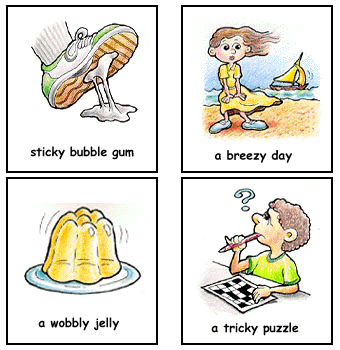
| http://www.sunshine.co.nz/nz/kia/coolstore/v1/msp/space4.html
|
| Literacy Hour is part of the Sunshine Online publisher's website for teachers and students. My Secret Planet is one example of the many activities for students that are available at this site. Here, students can generate their own poem by clicking on illustrated vocabulary items. |
| The activity is played online and no download is required. You need the Shockwave Flash plug-in which can be downloaded at the site by clicking on Technical Queries. It is also recommended that you use the most recently released version of Netscape Navigator or Microsoft Internet Explorer. |
| 1. | To revise and extend adjectives for describing nouns.
|
| 2. | To give students an opportunity to experiment with sound and
word patterns. |
| Vocabulary: | Earth and space Food |
| Grammar: | Using adjectives to describe objects |
| Text types: | Poems |
| 1. | Look at the website and try the activity to see if it is
appropriate for your students. |
| 2. | Make sure that students already know the Earth,
space and food nouns in the Vocabulary section above. There will be some new vocabulary in My secret planet
(mostly adjectives) which your students can discover when they try the activity. There are
illustrations to help students understand the meanings of the adjectives. |
| 3. | You might like to prepare the students for the activity by
putting the following words on the board and asking them to match the rhyming pairs:
Point out that rhyming words can sometimes have the same sounds but different spelling
patterns, such as face and case. |
| 4. | Tell students to go to the website and create a rhyming poem.
Draw students' attention to the five columns and the column headings. Explain that they
need to choose one item from each column. Ask them to print out their poems so that you
can use them in the next lesson. |
If you have ideas or suggestions about related activities that would be useful for your students, please let us know by clicking on the Comments button.
All the pop-up screens from this PrimeTeach file have been copied here so that you can print them out easily.
| Example: |
|
||||||||
| Example: | In my big banana rocket, around the stars I race, to a patchy purple planet that I found in outer space. |
||||||||
| Example: |
|
||||||||
| Example: |
|
||||||||
| Example: |
|
| 3. | Example: | 
Freezy and globby are not commonly used words in everyday English. |
||||||||||||||||||
| 4. | Example: | Choose vocabulary from the list below in order to make
up a new poem.
moon, yellowy, huge, green, sandy, turnip, fantastic, shiny, sparkly,
cucumber, enormous, yellow, wonderful, gold, silver, orange, watermelon,
pumpkin, smelly, lovely, dusty |
For more information on using nouns, look at the following in PrimeGram:
| Grammar: Word classes: Nouns: Overview |
For more information on the use of adjectives and their order, look at the following in PrimeGram:
| Grammar: Word classes: Adjectives: Overview |
| http://www.sunshine.co.nz/nz/kia/coolstore/v1/msp/space4.html |
![]()